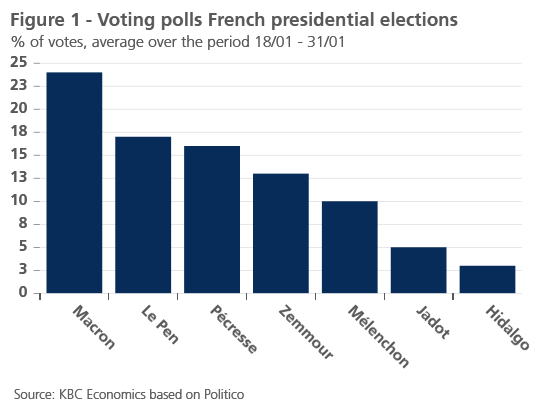Elections in France: don’t just focus on the President


The President is a powerful figure in France. Among other things, he/she can appoint ministers, dissolve parliament, grant pardons and negotiate and ratify international treaties. Despite the far-reaching powers of the office, the president is still largely dependent on parliament for the smooth implementation of his/her policy agenda. Yet, the media’s focus is currently almost exclusively on the presidential election in April and little attention is paid to the parliamentary election in June. However, the disappointing results of Macron’s party in the 2021 regional elections and the economic challenges facing the country make these elections important.
April 2022 promises to be an exciting month for French politics as voters will then decide who will become the new president of the republic. Incumbent President Macron will be up against candidates all over the political spectrum. As in previous elections, there is a good chance that two rounds of voting will be needed to determine the winner. After all, it is unlikely that any of the candidates will achieve an absolute majority in the first round - the political divisions in France are too great for that (see Figure 1). The battle will therefore be decided in the second round, which will take place at the end of April, between the two candidates that received the most votes in the first round.

Not a done deal
Which two candidates will cross swords in the second round is difficult to predict. President Macron leads in the election polls with about 25% of the votes. In second place, we find an ex aequo between Le Pen (Rassemblement National) and Pécresse (Les Républicains), both of which can count on a voter share of about 16% in the polls. However, these poll results are only a snapshot and a lot can still change in the run-up to the elections. Moreover, polls are not always reliable. Le Pen’s party experienced this just recently in the last regional elections, where it performed well below poll expectations. The low turnout in those same elections suggests that there is a lot of political discontent among the French electorate. This is an additional challenge for all candidates.
If the polls prove to be truthful, the second round will therefore be decided between President Macron on the one hand and Le Pen or Pécresse on the other. Especially the outcome of the second option is difficult to predict given the very small lead of Macron over Pécresse in the polls for the second round (53% vs 47%). Compared to Le Pen, he has a slightly better chance, although the polls are incredibly close for this combination as well (57% vs. 43%). Especially if you take into account that there is a margin of error in the various polls.
The ‘forgotten’ election
The outcome of the presidential election will help shape the future of the French (and European) economy. A Macron victory will undoubtedly put the pension reform back on the table. If Le Pen becomes the new president, relations with the EU will probably become a lot more tense. Although her party has dropped its Frexit rhetoric since the last presidential election in 2017, largely as a result of the UK’s bumpy brexit trajectory.
Although the president’s powers are considerable in France, the presidential election is not the only election that matters. After the presidential election, a new parliament is also elected. This vote is also very important because the outcome largely determines the extent to which the elected president can smoothly implement his/her political agenda. Without the support of the Prime Minister and the Parliament, it is much more difficult for the President to translate words into action.
For a large part of his term, President Macron has enjoyed an absolute majority in parliament (several ministers chose to leave the party in 2020). This has allowed Macron to implement some important reforms (such as the unemployment benefit reform) and to launch a substantial covid recovery plan. However, the results of his party, La Republique en Marche!, in the regional elections suggest that it will not be easy for Macron to win a majority in parliament. So the 2022 parliamentary elections will certainly be important.
Challenges
The French economy has many strengths, including a strong luxury goods manufacturing industry, but there are also many areas that call for improvement. Just think of the high and rising debt ratio of companies (figure 2) and the government (figure 3). Or the increased competition from emerging markets, which has reduced the market share of French companies for lower quality goods.


The structural challenges facing the French economy and the continuation of the post-pandemic recovery can be more easily addressed if the President and the Parliament are on the same wavelength. Consequently, it is dangerous to focus only on the presidential elections.
